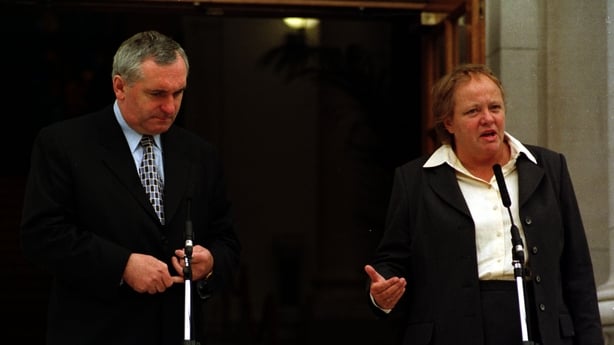By David McCullagh, Conor McMorrow and Justin McCarthy
Irish officials in London were concerned about a whispering campaign to undermine Mo Mowlam in her early months as secretary of state for Northern Ireland.
A series of articles in UK newspapers were "designed to present her in an unflattering light", claimed Irish Ambassador Ted Barrington in a July 1997 letter to the Department of Foreign Affairs in Dublin.
"The whispering campaign is focussed, sustained and sinister," wrote Mr Barrington. A handwritten note on the letter added that it was "a worrying campaign" that did not serve Irish interests.
The Irish officials wrote that, along with leaks from the Northern Ireland Office (NIO) in Belfast, they added up to "a campaign to undermine her self-confidence as well as her standing and authority in government and in Northern Ireland."
'The evidence suggests that forces within the NIO who are unsympathetic to her style and outlook are combining with pro-Unionist sections of the London media'
When Dr Mowlam was appointed northern secretary in May 1997, an Irish Government briefing note mentioned her medical problems – she had undergone radiotherapy that January on a brain tumour; cancer was to cause her death in 2005.
The note stated that she had been "advised by her doctors to build in rest periods during the day, and to reduce the punishing workload she previously imposed on herself."
Such comments in a government document were one thing; it was far more serious when questions were raised about her health in the media.
State Papers 1997-98: The hard slog towards agreement
7 things we learned from the State Papers: Day three
Keeping a 'frightened' Trimble onside
Ambassador Barrington said it was difficult to be certain who was behind the campaign against her.
"The evidence suggests that forces within the NIO who are unsympathetic to her style and outlook are combining with pro-Unionist sections of the London media to create the image of a Secretary of State who is not on top of the job, who lacks authority, and whose health is in question."
He added: "Not long after her appointment Paul Bew, of Queen's University, spoke to me about Mowlam’s lack of knowledge of the lexicon of Anglo-Irish relations, her garrulousness and her propensity to put her foot in it."
The Ambassador said the remarks were made at a conference in London in the presence of others and he "felt obliged to defend the Secretary of State".
Backing for Mowlan questioned
He did point out that Ulster Unionist Party leader David Trimble had not criticised Mowlam in his presence, and instead "reserves his fire for current and past members of the Irish Government".
Barrington said he could not think of any other member of the Labour government who had had to endure a similar attack. He said that Peter Mandelson was criticised, and was "the subject of more gossip than most", but articles about him were written from "a position of grudging and fearful respect".
'There would appear to be growing strains between Mowlam and Downing Street'
He said that the Blair government was enjoying a honeymoon, but questioned if Mowlam was receiving the full backing of the government machine, her ministerial colleagues and her department.
He wrote: "Someone who was involved in the process over the past months asked me ruefully how is it that when things go right it is the Prime Minister that gets the profile; and when things go wrong or are dodgy it is the Secretary of State?"
There were concerns that Mo Mowlam had not yet developed an effective working relationship with officials in the NIO. "I do not have the impression of a happy ship, and there would appear to be growing strains between Mowlam and Downing Street and perhaps between Mowlam and some of her officials in the NIO."

The Ambassador said he was also struck by Mowlam's private secretary, Helen Jackson, asking that Irish officials offer the secretary of state "private friendship and public support".
"It was a strange appeal that really only makes sense if Mowlam is under the kinds of internal pressure that we suspect," wrote Ambassador Barrington.
He added that Mowlam "is resilient and tough, and capable of shrugging off attacks on her from the media. But if these represent a deeper movement within Party or Government circles, she may face an even more difficult time ahead than she expected."
The Irish officials believed Mowlam took up her position better prepared than most of her predecessors and with "a more thorough appreciation of the Irish Government’s position".
"I believe she is sympathetic to a settlement that would suit our interests in terms of the protection of the rights of the Nationalist community and North-South cooperation. These indeed may well be the reasons why she has come under attack," said Barrington.
"Her opponents may calculate that, even if they do not succeed in having her removed or reshuffled, their criticisms will have the effect of undermining her authority and judgement…".
Based on documents now available to view in the National Archives of Ireland.

